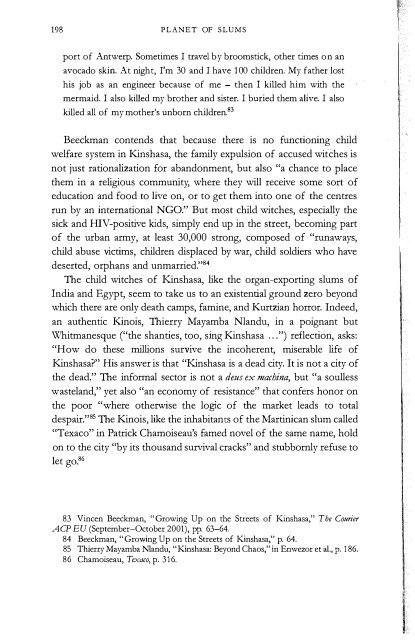Untitled - Rebel Studies Library
Untitled - Rebel Studies Library
Untitled - Rebel Studies Library
Create successful ePaper yourself
Turn your PDF publications into a flip-book with our unique Google optimized e-Paper software.
198 PLANET OF SLUMS<br />
port of Antwerp. Sometimes I travel by broomstick, other times on an<br />
avocado skin. At night, I'm 30 and I have 100 children. My father lost<br />
his job as an engineer because of me - then I killed him with the<br />
mermaid. I also killed my brother and sister. I buried them alive. I also<br />
killed all of my mother's unborn children. 83<br />
Beeckman contends that because there is no functioning child<br />
welfare system in Kinshasa, the family expulsion of accused witches is<br />
not just rationalization for abandonment, but also "a chance to place<br />
them in a religious community, where they will receive some sort of<br />
education and food to live on, or to get them into one of the centres<br />
run by an international NGO." But most child witches, especially the<br />
sick and HIV-positive kids, simply end up in the street, becoming part<br />
of the urban army, at least 30,000 strong, composed of "runaways,<br />
child abuse victims, children displaced by war, child soldiers who have<br />
deserted, orphans and unmarried."84<br />
The child witches of Kinshasa, like the organ-exporting slums of<br />
India and Egypt, seem to take us to an existential ground zero beyond<br />
which there are only death camps, famine, and Kurtzian horror. Indeed,<br />
an authentic Kinois, Thierry Mayamba Nlandu, in a poignant but<br />
Whitmanesque ("the shanties, too, sing Kinshasa ... ") reflection, asks:<br />
"How do these millions survive the incoherent, miserable life of<br />
Kinshasa?" His answer is that "Kinshasa is a dead city. It is not a city of<br />
the dead." The informal sector is not a deus ex machina, but "a soulless<br />
wasteland," yet also "an economy of resistance" that confers honor on<br />
the poor "where otherwise the logic of the market leads to total<br />
despair."85 The Kinois, like the inhabitants of the Martinican slum called<br />
"Texaco" in Patrick Chamoiseau's famed novel of the same name, hold<br />
on to the city "by its thousand survival cracks" and stubbornly refuse to<br />
let gO.86<br />
83 Vincen Beeckman, "Growing Up on the Streets of Kinshasa," The Courier<br />
ACP EU (September-October 2001), pp. 63-64.<br />
84 Beeckman, "Growing Up on the Streets of Kinshasa," p. 64.<br />
85 Thierry Mayamba Nlandu, "Kinshasa: Beyond Chaos," in Enwezor et aI., p. 186.<br />
86 Chamoiseau, Texaco, p. 316.<br />
I<br />
Epilogue<br />
Down Vietnam Street<br />
The promise is that again and again, from the garbage,<br />
the scattered feathers, the ashes and broken bodies,<br />
something new and beautiful may be born.<br />
John Berge?<br />
The late-capitalist triage of humanity, then, has already taken place. As<br />
Jan Breman, writing of India, has warned: "A point of no return is<br />
reached when a reserve army waiting to be incorporated into the labour<br />
process becomes stigmatized as a permanently redundant mass, an<br />
excessive burden that cannot be included now or in the future, in<br />
economy and society. This metamorphosis is, in my opinion at least,<br />
the real crisis of world capitalism."2 Alternately, as the CIA grimly<br />
noted in 2002: "By the late 1990s a staggering one billion workers rep<br />
resenting one-third of the world's labor force, most of them in the<br />
South, were either unemployed or underemployed."3 Apart from the de<br />
Sotan cargo cult of infinitely flexible informalism, there is no official<br />
scenario for the reincorporation of this vast mass of surplus labor into<br />
the mainstream of the world economy.<br />
1 John Berger, "Rumor," preface to Tekin, Beryi Kristin, p. 8.<br />
2 Breman, The Labouling Poor, p. 13.<br />
3 Central Intelligence Agency, The World Fac/book, Washington, D.C. 2002,<br />
p. 80.


